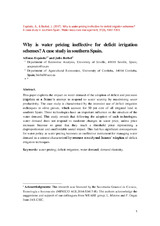Mostrar el registro sencillo del ítem
Why Is Water Pricing Ineffective for Deficit Irrigation Schemes? A Case Study in Southern Spain
| dc.contributor.author | Expósito, Alfonso | |
| dc.contributor.author | Berbel, Julio | |
| dc.date.accessioned | 2021-10-29T08:29:56Z | |
| dc.date.available | 2021-10-29T08:29:56Z | |
| dc.date.issued | 2017 | |
| dc.identifier.uri | http://hdl.handle.net/10396/21998 | |
| dc.description.abstract | This paper explores the impact on water demand of the adoption of deficit and precision irrigation as a farmer’s attempt to respond to water scarcity by maximising water productivity. The case study is characterised by the intensive use of deficit irrigation techniques in olive groves, which account for 50% of all irrigated land in southern Spain. These technologies have an important influence on the structure of the water demand. This study reveals that following the adoption of such technologies, water demand does not respond to moderate changes in water price, unless price increases become so great that they reach a threshold price representing a disproportionate and unaffordable social impact. This fact has significant consequences for water policy as water pricing becomes an ineffective instrument for managing water demand in a context characterised by resource scarcity and farmers’ adoption of deficit irrigation techniques. | es_ES |
| dc.format.mimetype | application/pdf | es_ES |
| dc.language.iso | eng | es_ES |
| dc.publisher | Springer | es_ES |
| dc.rights | https://creativecommons.org/licenses/by-nc-nd/4.0/ | es_ES |
| dc.source | Water Resources Management 31, 1047-1059 (2017) | es_ES |
| dc.subject | Water pricing | es_ES |
| dc.subject | Deficit irrigation | es_ES |
| dc.subject | Water demand | es_ES |
| dc.subject | Demand elasticity | es_ES |
| dc.title | Why Is Water Pricing Ineffective for Deficit Irrigation Schemes? A Case Study in Southern Spain | es_ES |
| dc.type | info:eu-repo/semantics/article | es_ES |
| dc.relation.publisherversion | https://doi.org/10.1007/s11269-016-1563-8 | es_ES |
| dc.relation.projectID | Gobierno de España. AGL2014-53417-R | es_ES |
| dc.rights.accessRights | info:eu-repo/semantics/openAccess | es_ES |

